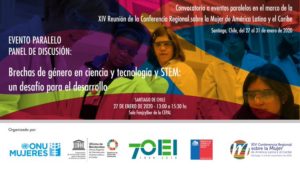 On January 27, 2020, within the framework of the XIV Regional Conference on Women in Latin America and the Caribbean (Santiago de Chile, January 27-31), the side event and panel discussion Gender gaps in science and technology and STEM: a challenge for development will be held. Aimed at officials, scientists, activists and citizens in general, it is organized by the UNESCO Regional Science Office for America and the Caribbean, UN Women, the Organization of Ibero-American States and the Ministry of Women and Gender Equality of Chile . It will take place from 1:00 p.m. to 3:30 p.m. in the Fajnzylber auditorium of ECLAC.
On January 27, 2020, within the framework of the XIV Regional Conference on Women in Latin America and the Caribbean (Santiago de Chile, January 27-31), the side event and panel discussion Gender gaps in science and technology and STEM: a challenge for development will be held. Aimed at officials, scientists, activists and citizens in general, it is organized by the UNESCO Regional Science Office for America and the Caribbean, UN Women, the Organization of Ibero-American States and the Ministry of Women and Gender Equality of Chile . It will take place from 1:00 p.m. to 3:30 p.m. in the Fajnzylber auditorium of ECLAC.
The analysis of gender gaps in science, technology and higher education in Latin America shows that in several countries there is a panorama of relative parity, while in others a disparity persists in women's access to positions equivalent to those they achieve. men in scientific and higher education institutions. This relative parity can be considered the fruit of a long process of social and cultural change that has been faster in some countries than in others.
Unfortunately, with some exceptions, the efforts that have been made do not effectively resolve all the institutional and sociocultural barriers that still exist. Horizontal and vertical segregation remains high. Women researchers continue to be underrepresented at the highest career levels and remain a minority in many science, technology, engineering and mathematics (STEM) fields in most countries. the region.
The event will be the opportunity to discuss this panorama, hand in hand with national and international experts, both from a quantitative and qualitative point of view, according to recent studies carried out by both the Ibero-American Observatory of Science, Technology and Society (OCTS-OEI), as well as by the organizing institutions.
What is the current situation of women in science and technology? How to increase the role of women in science to achieve sustainable development goals? What are the economic implications of gender gaps in science and technology? These are some of the questions that will guide the discussion.
For her part, Ms. Lidia Brito, Director of the Regional Science Office, will present the STEM and Gender Advancement Project (SAGA, for its acronym in English), referring to women in science, technology, engineering and mathematics, (*) –currently being implemented in Chile-.
The conceptual proposal of said discussion is framed in the main theme that calls for the XIV Regional Conference: the autonomy of women in changing economic scenarios. In this way, in general terms, and specifically from the perspective of science, it will contribute to the general objective of the Conference of periodic identification of the regional and subregional situation regarding the autonomy and rights of women, and present recommendations regarding public policies on gender equality in compliance with regional and international agreements.
The Regional Conference on Women in Latin America and the Caribbean is the main intergovernmental forum on women's rights and gender equality in the region. It takes place every three years and is organized by ECLAC, with the support of the United Nations Entity for Gender Equality and the Empowerment of Women (UN Women).
This activity constitutes a contribution from the UNESCO Regional Science Office for Latin America and the Caribbean to the full exercise of women's Right to Science, a right established as such from the Universal Declaration of Human Rights, in which article 27 stipulates that: “Every person has the right… to participate in scientific progress and the benefits that result from it… Every person has the right to the protection of the moral and material interests that correspond to them by reason of scientific productions…”; which deepens with the International Covenant on Economic, Social and Cultural Rights, (article 15) and, at the inter-American level, with the American Convention on Human Rights –particularly in article 14 of the San Salvador Protocol on Economic, Social and Cultural Rights – DESC
(*) Since 2015, the UNESCO Global SAGA project has been working with governments and policymakers around the world on a variety of tools to help reduce the current global gender gap in STEM fields, that exists at all levels of education and research. Countries such as Gambia, Kenya, Lebanon, Sudan and Thailand have already benefited from the program, as have Argentina, Haiti, Jamaica and Uruguay in Latin America and the Caribbean. Currently, this innovative methodology is being implemented in Canada and Chile. The initiative has so far mobilized some 160 experts from 90 national institutions and almost 20 international institutions.
